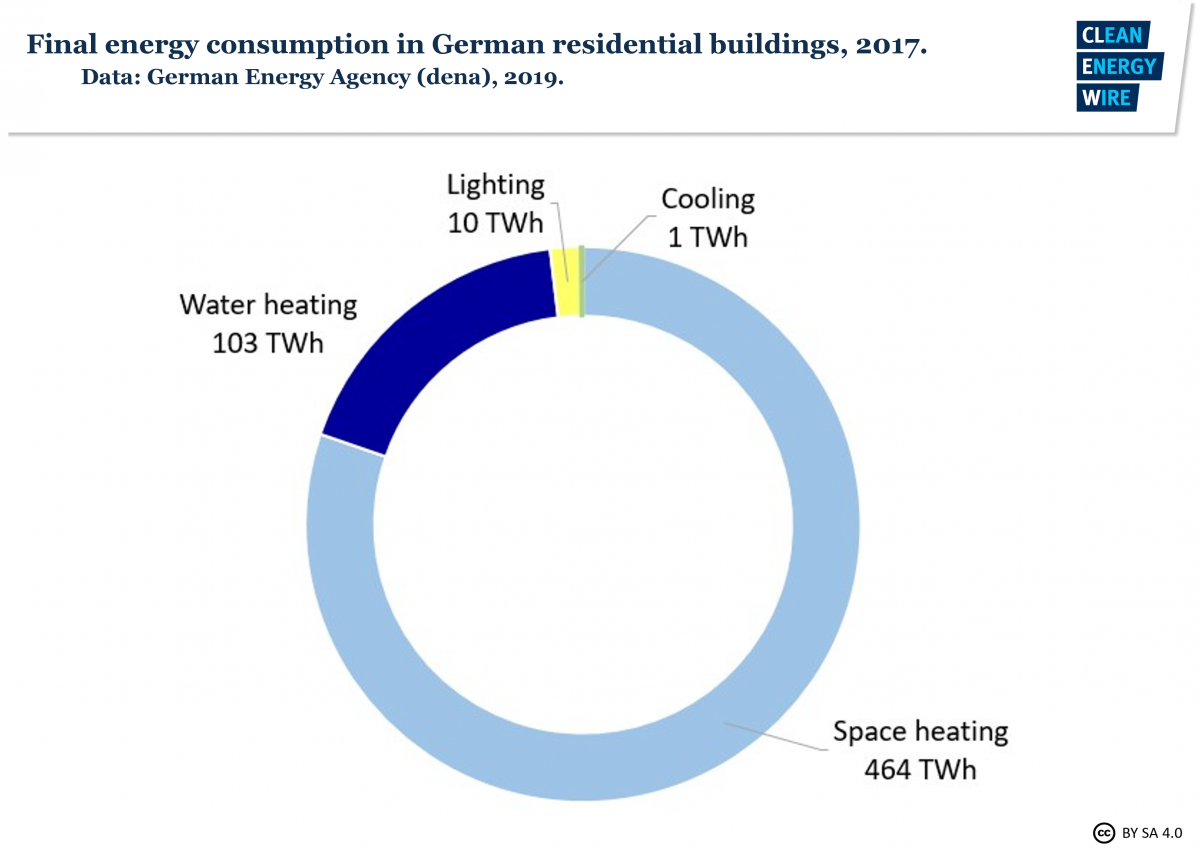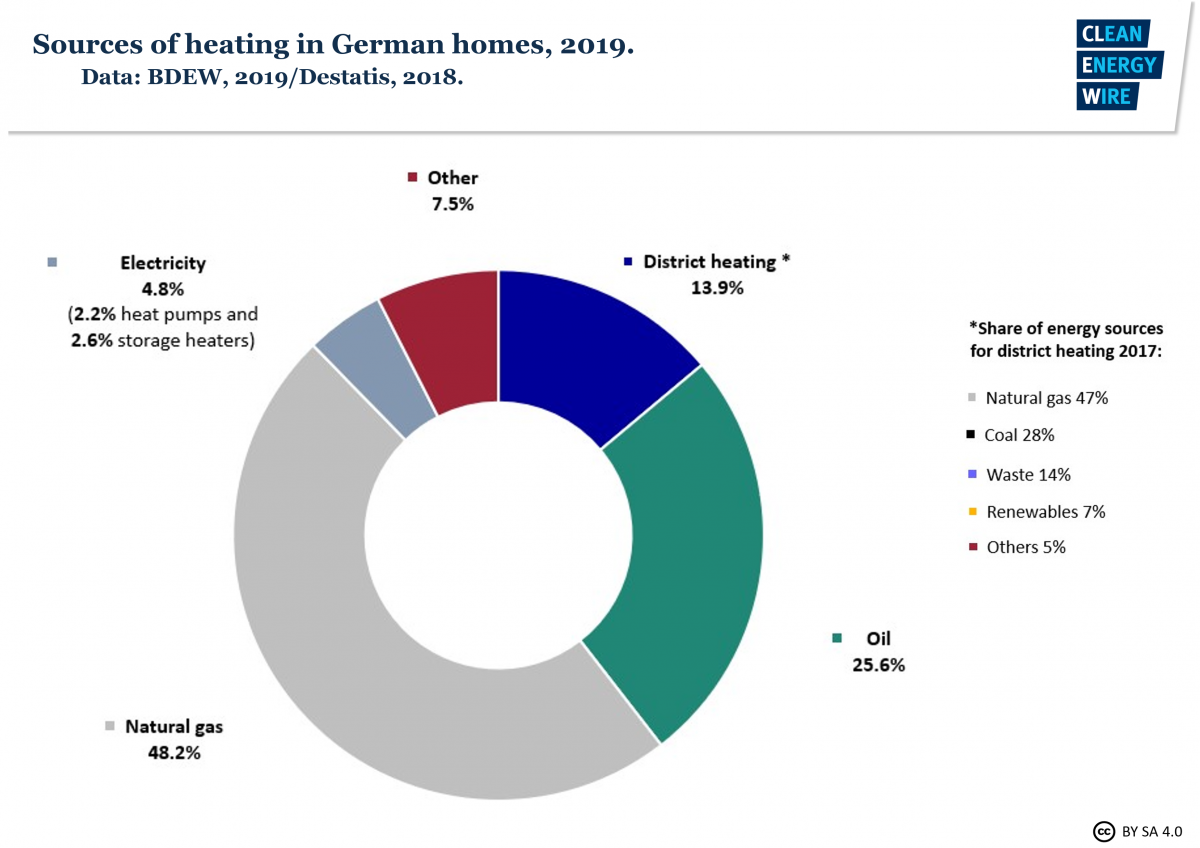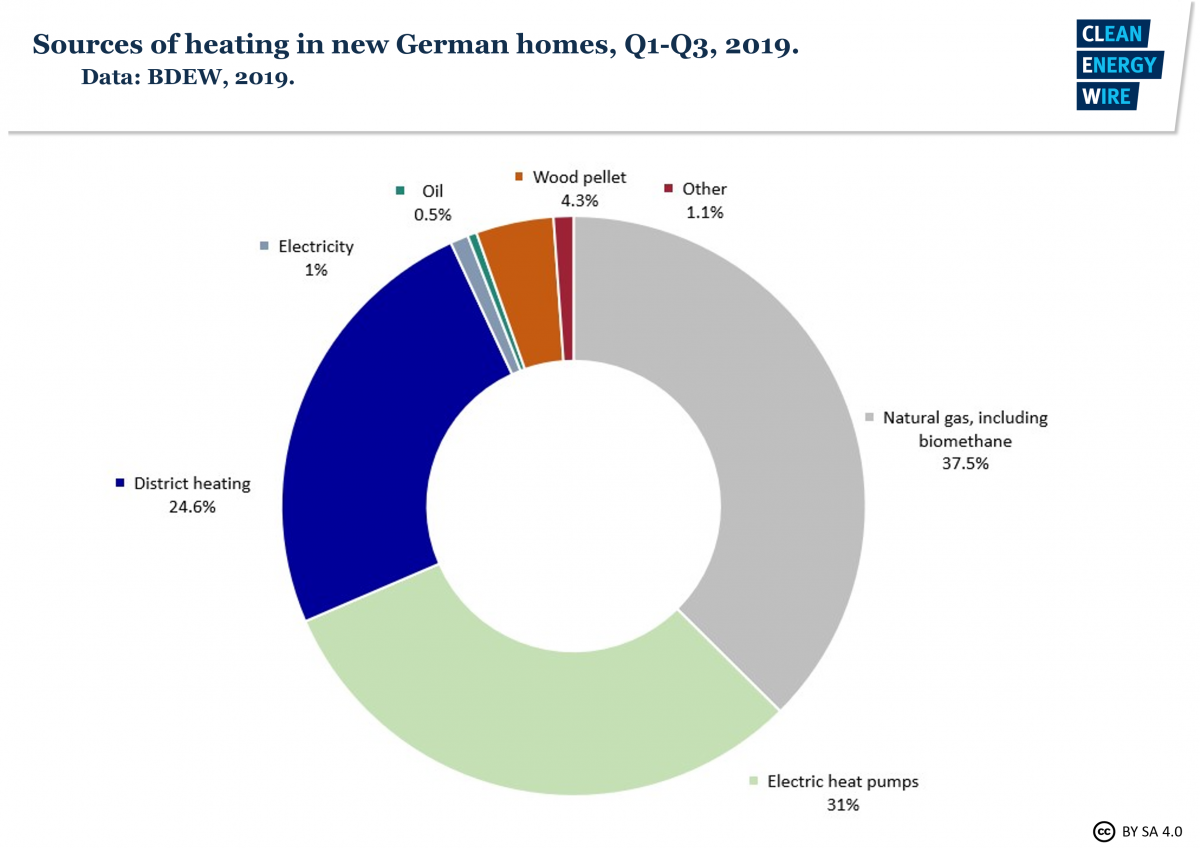Heating 40 million homes – the hurdles to phasing out fossil fuels in German basements
About 9.4 percent of Germany's total CO2 emissions in 2018 went on keeping 83 million people's homes warm and supplied with hot water. These emissions have fallen by 30.6 percent between 1990 and 2016, while fluctuating a lot depending on weather conditions from year to year. By far the most energy used in the German heating sector is for space heating, fuelled mainly by natural gas and oil. In fact, fossil fuels still keep almost three in four of all German homes warm. About 18 percent of the final energy consumption in residential buildings goes into heating water, while only about one percent is used for cooling rooms.
Roughly half of the country's 40 million homes are heated with natural gas, a quarter with oil and almost 14 percent with district heating. District heating in Germany is mainly powered by natural gas and coal, while waste and renewable energies contribute a smaller share.
The remaining homes in Germany are mainly supplied with heat through electricity, electric heat pumps and biomass – by a wide margin the most used renewable energy source in the heating sector. Geothermal energy and solar heat, however, also contribute a small share of heating in homes. In 2017, renewables supplied about 16 percent of the heating in all homes.
The average German heating system is 17 years old, while around 40 percent were installed more than 20 years ago – the age when the heating industry recommends replacing boilers with a newer model. This high average age leaves "enormous potential" for a transition in heating, utilities association BDEW says in its study on how German homes are heated.
Residential buildings make up 87 percent of Germany's building stock and account for more than half of all emissions in the buildings sector. Germany's approximately three million non-residential buildings, used for businesses, offices, healthcare, education and more, are therefore responsible for a comparatively large share of emissions and pose their own challenges.
Slow-burn switch
During the past ten years, around 1.7 million – or just 4.2 percent – of Germany's 40 million homes have had their heating system changed. Most Germans who decided to switch energy source when renewing their heating system over the past ten years opted for natural gas (83%), but "overall, the momentum is low and the potential is far from exhausted”, says BDEW. About 188,000 homes have switched to district heating (from oil or gas) during the same period.
Looking further back on the last 25 years, the use of heating oil has fallen by around 8 percent, while the use of natural gas has increased by about 12 percent. At the same time, district heating and electric heat pumps have each risen by about 2 percent.
The trend in new German buildings is, however, quite different. Here, electric heat pumps and solar heat in combination with gas have, over the last decade, taken a leap forward. In 2018, renewable energies – with a share of 47.2 percent – for the first time overtook gas as the primary source of heating in new residential buildings finished that year. But both now and in the future, old buildings will dominate the share of heated area in Germany, making them an inescapable part of the so-called "Wärmewende", transition in heating.
Government's climate package tackles oil-fired heating
Oil-fired heating emits more CO2 per kilowatt-hour (kWh) than any other system besides coal-fired heating, which is only used in about 0.2 percent of German homes today. This, coupled with the high age and inefficiency of many oil-fired heating systems, makes it an obvious shortcut to cutting emissions. Half of all oil-fired heating systems are more than 20 years old and around 15 percent were installed more than 30 years ago.
In order to exploit this potential, the German government in its new Climate Action Programme 2030 has decided to ban the installation of oil-fired heating systems from the year 2026 in buildings where more climate friendly alternatives are available – opting out of an outright ban.. To make this economically easier on consumers, a "swap-premium" for replacing old oil-fired heating systems will be introduced which repays up to 40 percent of the costs for a new and more efficient system. Germany's national carbon pricing system covering the buildings and transport sector is also meant to encourage the switch from fossil fuels to more climate friendly energy sources for heating.
CO2 to be saved
A lot of CO2 can be saved through these measures, estimates BDEW: Of the 5.8 million residential buildings in Germany which are still heated with oil, 2.7 million could relatively easily be linked to a gas or district heating pipeline. This would save 14 million tonnes of CO2. Exchanging their oil-fired heating systems with other modern heating systems, such as electric heat pumps, would save up to 30 million tonnes of CO2.
A paper by the German Energy Agency (dena) also shows that switching to an electric heat pump or pellet heating can save 58 percent and 89 percent of emissions respectively in comparison to an old oil-fired heating system. But both these options have high investment costs, and electric heat pumps often require that a building's external walls are insulated, causing costs to rocket even higher, often out of reach for consumers.
Germany's southern states have about twice as many oil-fired heating systems as the northern but many buildings in the southern states are not yet connected to the gas grid, leaving fewer options for a new system. Instead, even switching from an old oil-fired heating system to a new oil-fired condensing boiler would save up to 14 percent of CO2 emissions, says dena – and supplementing this with solar heat can save up to 24 percent.
It's complicated
When homeowners decide to replace their heating system and have enough money for the investment, deciding which type of boiler to install is far from simple for the average user. Lack of knowledge about the different heating systems' advantages, cost-effectiveness and subsidies for installing them pose an obstacle for many people. To make matters more complicated, which investment makes more sense often depends on a number of interrelated factors. For example, if a houseowner can invest in building insulation, a more energy efficient heating system such as an electric heat pump may be possible to install than if insulation measures are economically out of reach.
The government has also endeavoured to make this more economical by allowing the energy-efficient renovation of homes to be tax-deductible from 2020. This will for example reduce the cost of installing new insulation or replacing old heating systems or windows by up to 20 percent. A highly heterogenous scene of building types and users – including tenants, landlords, homeowners and housing associations – however, still make it more difficult to regulate the heating sector than it has been done in the power sector. The new tax incentives, for example, only apply to owner-occupied dwellings, ruling out more than half of all German homes which are rented.
Due to their long life-span, which heating system is chosen today will have long-term effects on Germany's CO2 emissions. Electric heat pumps 10 years from now will, for example, form a more climate friendly alternative than today, assuming that the share of renewables in Germany's power mix grows as planned. Therefore, introducing energy labels based on how climate friendly a heating system will be in 10 years might be more useful than current labels, assessing their efficiency today.
The business of climate-friendly heating
Although the heating sector is complex, some German start-ups are working to make the transition less complicated and more climate friendly. Amazon-backed tado, for example, has developed smart thermostats to help lower emissions without the need to invest in expensive insulation or a new boiler. Start-up Thermondo, founded in 2012, has become Germany's largest heating system installer with the official motto “<2°” and a new digital approach to advising homeowners on how to modernise their heating systems.
Well-established energy service providers such as ista and techem are also working on climate friendly solutions and part of Germany's Alliance for Climate-Neutral Housing, along with heating technology companies such as Viessmann and Bosch. By pooling their expertise on smart energy management and heating technologies, all are working to bring down the energy use and emissions from German households.




